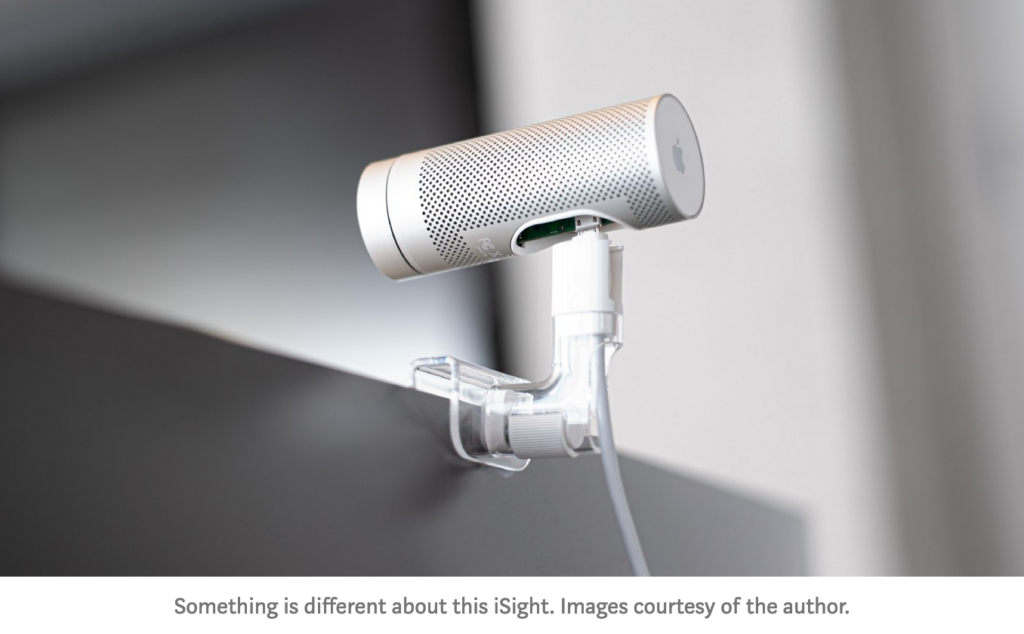Quote of the Day
”We have not overthrown the divine right of kings to fall down for the divine right of experts.”
- Harold Macmillan, speech in Strasbourg, 1950.
Musical alternative to the morning’s radio news
Beethoven: Moonlight Sonata, guitar arrangement. Played by Eric Henderson.
Making a modern webcam from the Apple iSight
I have an Apple iSight webcam, which I can’t bear to discard — even though it’s now very primitive (640×480 pixels) — because it’s such a beautiful object. But Max Braun had a better idea:
Why don’t we just put a whole computer running Linux in there? The Raspberry Pi Zero fits the iSight’s dimensions almost perfectly and, incredibly, it costs only $5.
So he did (plus some other bits and pieces)!
The result…
Lovely bit of geekery.
How to thrive in the gig-economy: hang your smartphone from a tree
When I first read this Bloomberg report I checked that it wasn’t a leftover from April 1st.
A strange phenomenon has emerged near Amazon.com Inc. delivery stations and Whole Foods stores in the Chicago suburbs: smartphones dangling from trees. Contract delivery drivers are putting them there to get a jump on rivals seeking orders, according to people familiar with the matter.
Someone places several devices in a tree located close to the station where deliveries originate. Drivers in on the plot then sync their own phones with the ones in the tree and wait nearby for an order pickup. The reason for the odd placement, according to experts and people with direct knowledge of Amazon’s operations, is to take advantage of the handsets’ proximity to the station, combined with software that constantly monitors Amazon’s dispatch network, to get a split-second jump on competing drivers.
That drivers resort to such extreme methods is emblematic of the ferocious competition for work in a pandemic-ravaged U.S. economy suffering from double-digit unemployment. Much the way milliseconds can mean millions to hedge funds using robotraders, a smartphone perched in a tree can be the key to getting a $15 delivery route before someone else.
The piece even has a photograph showing phones belonging to mobile delivery drivers hanging from a tree outside a Whole Foods store in Evanston, Illinois, on Aug. 29. {Whole Foods is owned by Amazon.]
HT to Cory Doctorow, who first spotted it.
Lunchtime: the latest Coronavirus logistical nightmare
If you have to go back to the office, and it’s in a high-rise office block, here’ a tip: bring a packed lunch. Just like you did at school.
Wired has a fascinating piece about the logistical nightmares that await returnees to these establishments.
In the before times, even the most decrepit lift systems were designed so that 12 per cent of people working in an office can arrive in a five minute window, and that the entire population of a given office could get to their respective floors (if they queued together in the lobby) within around 40 minutes. More efficient lift systems can cut that wait time in half, and on paper, it should be even quicker if you factor in that only 50 per cent of the workforce can come back to the office at any given time.
But since the coronavirus pandemic, companies can’t ram a dozen people into each elevator to speed up the time it takes from the lobby to high floors. Bigger lifts can fit four people while still respecting social distancing, and smaller cabs are restricted to two. Most companies have put stickers on each corner to indicate where people can stand, sometimes requesting for them to face the wall while they travel. Even if companies figure out how to efficiently stagger people’s working days to avoid a pile-up at 9am or at 5.30pm, they have no solution to the worst time of the day for lifts: lunchtime.
If 50 per cent of people in an office that relies on lifts decide to take their lunch between 12 and 2pm, it would take up to two and a half hours to get everyone back in their seats again, says Julian Olley, director of vertical transportation at consultancy Arup. And that’s if everything goes according to plan.
“They will create a bottleneck,” he says. “In that two hour period people want to go and come back again. That is irrespective of big financial services [companies] having canteens.”
One of the really fascinating things about this virus is the way its effects and implications creep into everything.
My university department is on three floors. It has a lift, but I never use it. Phew!
From the Leading-edge Uselessness department…
“These ‘anti-procrastination’ smart glasses use AI to monitor what you look at all day”.
The difficulty of staying focused in an age of distractions is one of those annoyingly accurate cliches. (I checked my phone three times just writing this paragraph.) But a startup named Auctify has what it claims is the solution: smart glasses that use AI to monitor what you’re looking at and nudge you to pay attention. Depending on your worldview, it’s the product of your dreams or a productivity-hacking nightmare.
The glasses are called Specs, and they launch today on Indiegogo. The premise is simple: a camera built into the frame of Specs uses machine learning to identify what you’re looking at, whether that’s a laptop, book, or a fellow human being. It records this data and sends it to a connected app where users can take action in a number of ways.
You couldn’t make this stuff up.
This blog is also available as a daily email. If you think this might suit you better, why not subscribe? One email a day, delivered to your inbox at 7am UK time. It’s free, and there’s a one-click unsubscribe if your decide that your inbox is full enough already!

